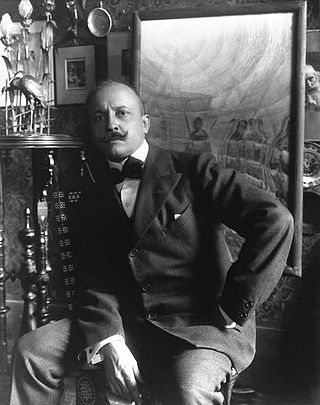
Filippo Tommaso Emilio Marinetti was an Italian poet, editor, art theorist, and founder of the Futurist movement. He was associated with the utopian and Symbolist artistic and literary community Abbaye de Créteil between 1907 and 1908. Marinetti is best known as the author of the first Futurist Manifesto, which was written and published in 1909, and as a co-author of the Fascist Manifesto, in 1919.

Futurism was an artistic and social movement that originated in Italy, and to a lesser extent in other countries, in the early 20th century. It emphasized dynamism, speed, technology, youth, violence, and objects such as the car, the airplane, and the industrial city. Its key figures included the Italians Filippo Tommaso Marinetti, Umberto Boccioni, Carlo Carrà, Fortunato Depero, Gino Severini, Giacomo Balla, and Luigi Russolo. Italian Futurism glorified modernity and according to its doctrine, aimed to liberate Italy from the weight of its past. Important Futurist works included Marinetti's 1909 Manifesto of Futurism, Boccioni's 1913 sculpture Unique Forms of Continuity in Space, Balla's 1913–1914 painting Abstract Speed + Sound, and Russolo's The Art of Noises (1913).

Eugenio Montale was an Italian poet, prose writer, editor and translator, and recipient of the 1975 Nobel Prize in Literature.

The Manifesto of Futurism is a manifesto written by the Italian poet Filippo Tommaso Marinetti and published in 1909. Marinetti expresses an artistic philosophy called Futurism that was a rejection of the past and a celebration of speed, machinery, violence, youth and industry. It also advocated the modernization and cultural rejuvenation of Italy.
Tiziano Fratus is an Italian poet and publisher.
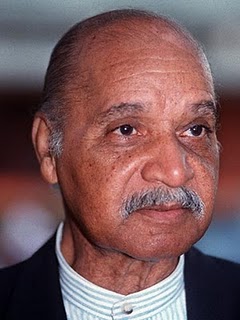
José Craveirinha was a Mozambican journalist, story writer and poet, who is today considered the greatest poet of Mozambique. His poems, written in Portuguese, address such issues as racism and the Portuguese colonial domination of Mozambique. A supporter of the anti-Portuguese group FRELIMO during the colonial wars, he was imprisoned in the 1960s. He was one of the African pioneers of the Négritude movement, and published six books of poetry between 1964 and 1997. Craveirinha also wrote under the pseudonyms Mário Vieira, José Cravo, Jesuíno Cravo, J. Cravo, J.C., Abílio Cossa, and José G. Vetrinha.

Luigi Ballerini is an Italian writer, poet, and translator.

Zang Tumb Tumb is a sound poem and concrete poem written by Filippo Tommaso Marinetti, an Italian futurist. It appeared in excerpts in journals between 1912 and 1914, when it was published as an artist's book in Milan. It is an account of the Battle of Adrianople, which he witnessed as a reporter for L'Intransigeant. The poem uses Parole in libertà and other poetic impressions of the events of the battle, including the sounds of gunfire and explosions. The work is now seen as a seminal work of modernist art, and an enormous influence on the emerging culture of European avant-garde print.
"[The] masterpiece of Words-in-freedom and of Marinetti’s literary career was the novel Zang Tumb Tuuum... the story of the siege by the Bulgarians of Turkish Adrianople in the Balkan War, which Marinetti had witnessed as a war reporter. The dynamic rhythms and onomatopoetic possibilities that the new form offered were made even more effective through the revolutionary use of different typefaces, forms and graphic arrangements and sizes that became a distinctive part of Futurism. In Zang Tumb Tuuum; they are used to express an extraordinary range of different moods and speeds, quite apart from the noise and chaos of battle.... Audiences in London, Berlin and Rome alike were bowled over by the tongue-twisting vitality with which Marinetti declaimed Zang Tumb Tuuum. As an extended sound poem it stands as one of the monuments of experimental literature, its telegraphic barrage of nouns, colours, exclamations and directions pouring out in the screeching of trains, the rat-a-tat-tat of gunfire, and the clatter of telegraphic messages." — Caroline Tisdall and Angelo Bozzola

Ego-Futurism was a Russian literary movement of the 1910s, developed within Russian Futurism by Igor Severyanin and his early followers. While part of the Russian Futurism movement, it was distinguished from the Moscow-based cubo-futurists as it was associated with poets and artists active in Saint Petersburg.

Mirella Bentivoglio was an Italian sculptor, poet, performance artist and curator.
Raffaello Baldini was an Italian writer and poet. His Ad nòta (1995) won the Premio Bagutta.
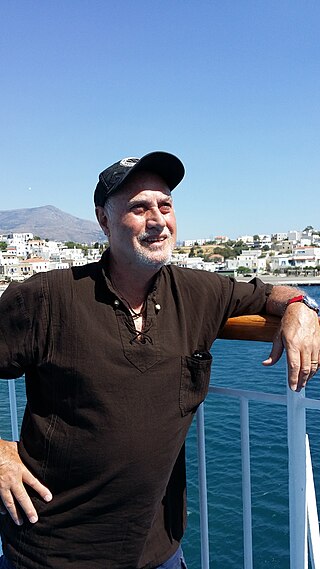
Luigi Augusto Fontanella is a poet, critic, translator, playwright, and novelist.
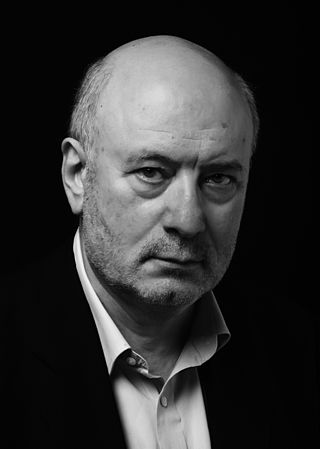
Giovanni Lista is an Italian art historian and art critic born in Italy on February 13, 1943, at Castiglione del Lago (Perugia) and resides in Paris. He is a specialist in the artistic cultural scene of the 1920s, particularly in Futurism.
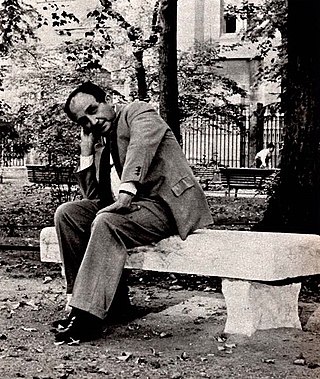
Alfonso Gatto was an Italian writer. Along with Giuseppe Ungaretti he is one of the foremost Italian poets of the 20th century and a major exponent of hermetic poetry.

Lacerba was an Italian literary journal based in Florence closely associated with the Futurist movement. It published many Futurist manifestos by Filippo Marinetti, Antonio Sant'Elia, and others.
The Futurist Painting: Technical Manifesto (1910) by Umberto Boccioni (1882-1916) was the first exposition of the theoretical underpinnings of Italian Futurist painting.
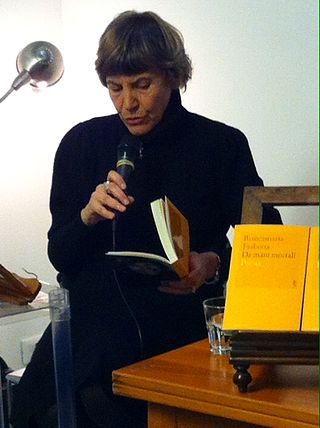
Biancamaria Frabotta was an Italian writer. She promoted the study of women writers in Italy and her early poetry focused on feminist issues. The main themes of her later works are melancholy, the dichotomy between Nature and History and between Action and Contemplation, the relationship between the body and the self, and conjugal love. Besides essays on feminism and academic works on poets such as Giorgio Caproni, Franco Fortini, and Amelia Rosselli, she wrote plays, radio-dramas, a television show on Petrarch, and a novel. Until her retirement in 2016, she taught Modern Italian Literature at the University of Rome La Sapienza, where she previously received her Laurea degree.
Circoli was an Italian language bimonthly literary magazine published in Genoa, Italy, between 1931 and 1936. It was described as one of the most distinguished European magazines in 1934.
Il Frontespizio was an Italian art and literary magazine, which had a Catholic perspective. The magazine existed between 1929 and 1940 and was based in Florence, Italy.

Omero Vecchi, known by his pen name Luciano Folgore, was an Italian poet.















